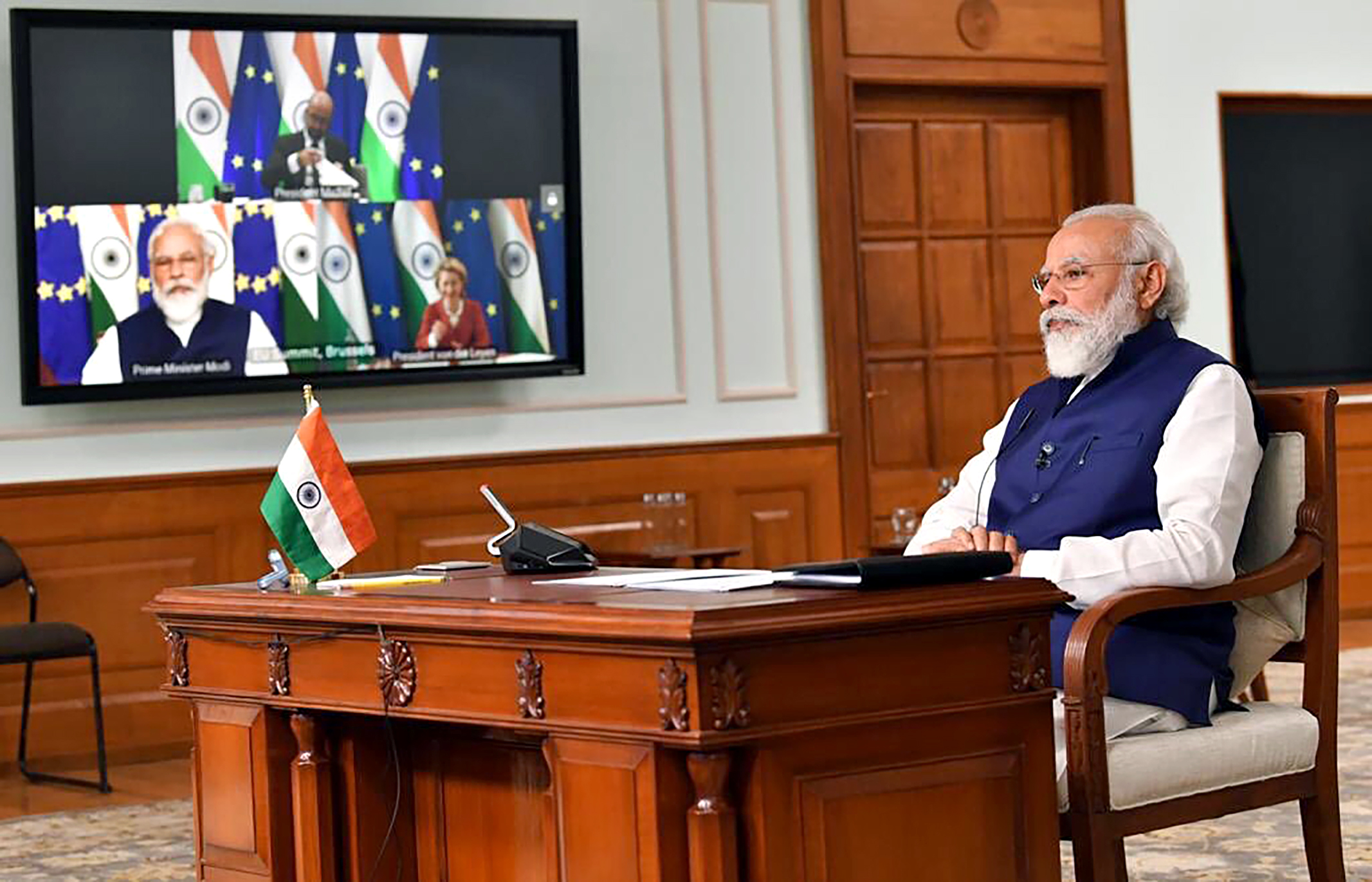The full potential of the India-EU bilateral partnership is yet to be realised.
At a time when the entire world is facing a serious socio-economic crisis arising out of the deadly Covid-19 pandemic, a global solidarity and a combined response mechanism was the need of the hour. The 15th India-EU Summit has finally inked an agreement to undertake exactly this gigantic task even as both the European Union and India are deeply affected by the pandemic originating from China.
Nothing can be more relevant and urgent at this time than creating a mechanism for partnership in the areas of healthcare, research in the field of diagnostics, medicine and treatment and creating a funding methodology for all this and more. For many of the emerging economies as well as the economically constrained EU members, affordability of healthcare has become germane to their very existence. The Covid-19 pandemic has underlined the importance of planning well in advance and foreseeing and creating effective preparedness as far as disruptive interventions and pandemics are concerned. The India-EU Summit has taken cognisance of this important aspect of governance and cooperation between countries and international institutions.
Disruptions in manufacturing and supply chain system have probably affected the normal conduct of trade and commerce between countries the most. Natural calamities and disasters are generally localised and short lived and hence supply chain disruption in such cases are manageable. In the present situation, trade and commercial transactions depending on wider global sourcing and demand fulfilment are the worst affected. This is felt even more strongly in the field of medical supplies and raw material of therapeutic nature. The joint press release by the leaders has taken note of this aspect and resolves to work together to mitigate problems arising out of such disruptions. As part of the process India will have to set up a special purpose vehicle (SPV) to recognise the risk factors, identify and increase the prospective areas of trade, create efficient transport and communication network, improve technology and encourage and increase logistic providers.
Another important development of the summit is the resolve to begin talks on Bilateral Trade and Investments Agreement (BTIA), which began in 2007, was suspended in 2013 and was revived in 2017 probably due to Brexit worries. Economic recovery is dependent on restructuring the economy, especially the manufacturing sector. This will need not only technology transfer but heavy investment. The EU and India have reaffirmed their commitment to work towards balanced, ambitious and mutually beneficial trade and investment arrangements, opening markets and providing level playing fields. The Narendra Modi government will have to set up a team of experts consisting of fewer bureaucrats and more from the industry and stakeholders for negotiating and inking a time bound BTIA.
A Free Trade Agreement (FTA) between India and EU remains a priority. Unfortunately, there seems to be no movement whatsoever in this direction to create a win-win situation. It seems neither India nor the EU has a balanced blueprint which could be mutually acceptable. India’s concerns need to be articulated so that a political consensus is built. There are a number of unresolved contentious issues including import tariffs and rules guiding government procurement. FTA perhaps could bring India and EU much closer in building a strategic partnership.
The past two decades have witnessed an ambitious and aggressive China rolling out its Belt Road Initiative (BRI), which has many client countries under heavy debt burden putting the global rule based open trading system at heavy risk. The Low Income Countries’ (LIC) Debt Sustainability Framework (DSF), which became operational in 2018, may have to be reworked and new parameters be set considering the interventions and economic stagnation due to the Covid-19 pandemic. The 15th Summit has welcomed the G20 Action Plan to support the global economy and enhance EU-India coordination on global economic governance to promote debt sustainability including among G20 countries. This should lay the ground rules for a new and improved global trade architecture in keeping with the core principles of the EU.
The EU is structured with all the parameters of a single market, internal market or what is referred to as a common market, which seeks to guarantee free movement of goods, capital, services and labour. These “four freedoms” will have to be structured into Indian economic revival plans without hurting the interests of the domestic market, manufacturing and industry.
Considering the fact that there is total convergence on India’s fundamental values and the core principles of the EU such as respect for human dignity and human rights, freedom, democracy, equality and the rule of law, the India-EU partnership is not limited to mere economic progress or trade and commerce. The 15th Summit has reiterated the need for all those countries which are committed to these values to come together and work for a better world.
Unfortunately, the intangibles remain intangibles despite the fact that both India and EU became strategic partners in 2004 and had envisaged a greater engagement in the Joint Action Plan articulated in 2005 and later revised in 2008. The full potential of the India-EU bilateral partnership is yet to be realised. There are a number of convergences including the domains of maritime and cyber security. There are signs of moderate engagement and the culmination of tangibles from intangibles is expected in due course of time from the bilateral commitments made in the 15th India-EU summit. The changing dynamics of geopolitics also warrant both India and the EU to engage in a much serious manner than before. The EU investment in India will gradually grow and will make India’s dream of “Make in India” getting realised. Such investment will further deepen India-EU strategic partnership and advance collaboration to see a defining moment of India-EU robust engagement. The defence and security cooperation will also be intensified in the foreseeable future.
Arvind Kumar teaches Geopolitics and International Relations at Manipal Academy of Higher Education, Manipal. Seshadri Chari is a well known political commentator and strategic analyst.

